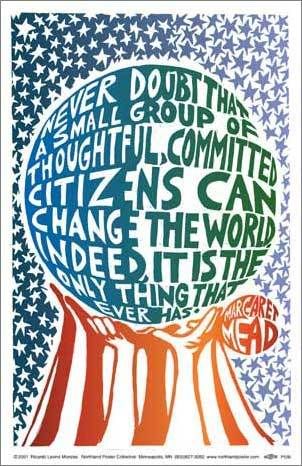It took me all this time to digest Sarah Palin’s comment at the GOP Convention about community organizers lacking any real responsibilities. Being a professional organizer myself, the comment left me uncharacteristally mute. Now finally, I’m ready to, as we say in organizing, “call the question” —
So, tell me, Governor Palin, whom should we hold responsible for the current challenges and debacles facing this country?
My answer? The American people,
And coincidentally enough that’s what organizers do — they hold the people accountable for the state of their communities, their workplaces, their churches, their organizations and ultimately their country and the world.
Since when, exactly, did civic responsibility become the exclusive sphere of the elected? Aren’t we all, in the end, responsible for the leaders we elect (or allow to be elected)? Weren’t the voting age citizens of Wasilla responsible for the state of their city before, during and after the reign of Mayor Palin?
Is there anything more American or democratic than shared resposibility? Aren’t we all of us here responsible for George Bush, the war in Iraq, the financial meltdown and the Katrina aftermath? Answer — yes. We are all responsible for each and every one of us not doing enough, not speaking out loudly enough, not participating enough, not holding our leaders accountable.
It is not John McCain’s job to “hold them accountable” — it is my job and yours. And if my community is crumbling, my economy is failing, my politicians are corrupt, I need look no further than my mirror to find someone to hold responsible.
A community organizer, like Barack Obama, goes into a community not to fix things, but to remind folks that they have the real power to do the fixing — by voting ineffectual politicians out, by bringing new investments in, by standing and working together and no longer accepting things as they are. And Barack Obama, the once organizer and now presidential candidate, understands our shared responsibility to make change happen.
To listen to McCain and Palin tell it, they have appointed themselves sheriff and deputy of Shittown, ready to ride in to the rescue, guns ablazin’, and clean up the corruption and the wasteful spending while we townfolk cheer them on from the sidelines. But sadly, corruption doesn’t begin and end in “Worshington,” Brother McCain — corruption and poor leadership impacts cities and townships, states and institutions all across America. You can find it easily in business and academia, in unions and charities, without binoculars from every kitchen table in America.
America doesn’t need a sheriff in chief. And America won’t change because a handful of slipperies are dragged into the light by Batman and Sarah. America will change when our culture changes from one of apathy and acceptance to one of anger and determination. America will change when her citizens start giving a damn enough to get off dead ass and do something about the things that plague us. America will change when regular folks take responsibility for the corrupt mayors and do-nothing governors, the greedy corporate and union bosses, when we vote and bust ass to get others to vote, when we exercise the power we all already have.
I was priviledged to work the past week with the wonderful men and women of MOSES, a faith-based community group in Detroit dedicating to just such principles — holding elected officials to their word, building community strength and changing their neighborhoods themselves instead of waiting around for the change fairy to make it happen. And the glue that holds MOSES and like movements together is an organizer.
Organizers have taken responsibility for building movements, shaping futures, righting injustices, saving communities using the power of people held responsible.
And that’s the difference between a professional politician like Sarah Palin and a professional organizer like Barack Obama — one has the ego to consider themselves alone responsible for our successes and failures — the other has the insight to know our responsibilities are shared.

3 comments